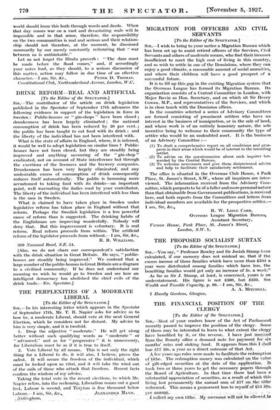DRINK REFORM—REAL AND ARTIFICIAL [To the Editor of the SPECTATOR.]
SIR,—The contributor of the article on drink legislation published in the Spectator of September 17th advances the following evidence in support of the legislation in force in
Sweden : Public-houses or " gin-shops " have been closed ; drunkenness has been largely eliminated ; the national consumption of drink has been reduced by 50 per cent. ; the public has been taught to eat food with its drink ; and the liberty of the individual has not been interfered with.
What is the state of affairs in England, where, it is inferred, it would be well to adopt legislation on similar lines ? Public- houses have not been closed, but they are steadily being improved and anything savouring of the " gin-shop " eradicated, not on account of State interference but through the exertions of the licensees and the brewery companies. Drunkenness has been very largely eliminated, and any undesirable excess of consumption of drink consequently rtduces itself automatically. The public is becoming more acenStomed to taking food with its drinks—an important point, well warranting the italics used by your contributor. The liberty of the individual has been interfered with less than is the ease in Sweden.
What is claimed to have taken place in Sweden under legislative refOrm' has taken place in England without that reform. Perhaps the Swedish 'legislation is a less powerful cause of reform than is suggested. The drinking habits of the Englishman are improving wonderfully. Nobody will deny that. But this improvement is voluntary. It is real reform. Real reform proceeds from within. The artificial reform of the legislator proceeds from without.—I am, Sir, &c., B. B. WILLIAMS.
309 Norwood Road, S.E. 24.
[Alas; we do not share our correspondent's satisfaction
with the drink situation in Great Britain. He says, " public- houses are steadily being improved." We contend that a large number of the public-houses in Great Britain area disgrace to a civilized community. If he does not understand our meaning we wish he would go to Sweden and see how an intelligent democracy has abolished the chief evils of the drink trade.—En. Spectator.]


















































 Previous page
Previous page